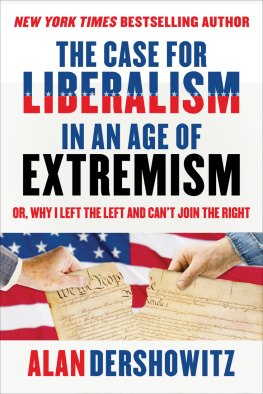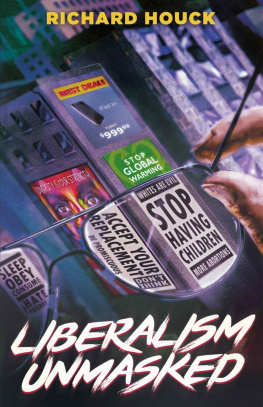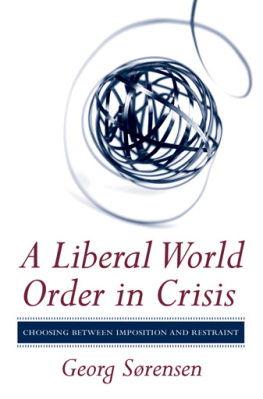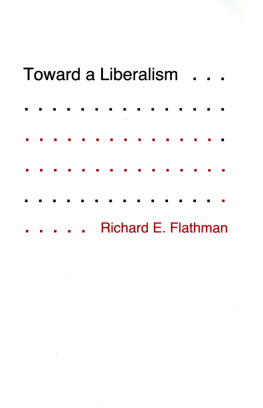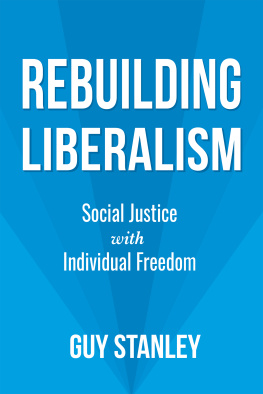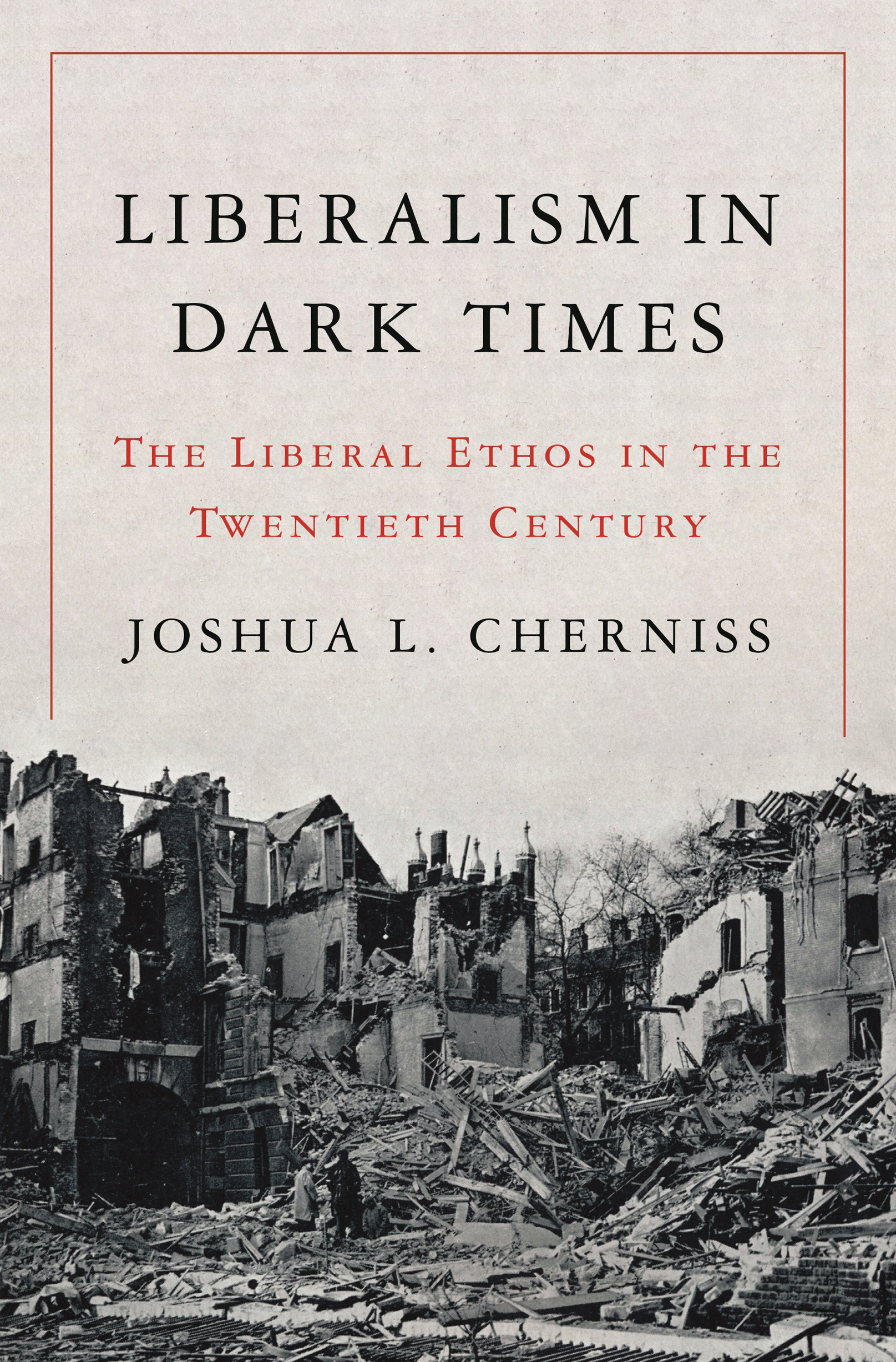LIBERALISM IN DARK TIMES
Liberalism in Dark Times
THE LIBERAL ETHOS IN THE TWENTIETH CENTURY
JOSHUA L. CHERNISS
PRINCETON UNIVERSITY PRESS
PRINCETON & OXFORD
Copyright 2021 by Joshua L. Cherniss
Requests for permission to reproduce material from this work should be sent to
Published by Princeton University Press
41 William Street, Princeton, New Jersey 08540
6 Oxford Street, Woodstock, Oxfordshire OX20 1TR
press.princeton.edu
All Rights Reserved
Extract from INFLAMMATORY ESSAYS 19791982 by Jenny Holzer copyright 2020 by Jenny Holzer, member / Artists Rights Society (ARS), New York, used by permission of ARS. All rights reserved.
ISBN 9780691217031
ISBN (e-book) 9780691220949
Library of Congress Cataloguing Number
British Library Cataloging-in-Publication Data is available
Editorial: Rob Tempio and Matt Rohal
Production Editorial: Debbie Tegarden
Jacket Design: Karl Spurzem
Production: Erin Suydam
Publicity: Alyssa Sanford and Amy Stewart
Copyeditor: Karen Verde
Jacket Credit: Ruins of the Inner Temple, London, UK, after the Blitz, 1941.
Photo: Heritage Image Partnership Ltd. / Alamy Stock Photo
To Cary and Deborah Cherniss
But the liberal deviseth liberal things; and by liberal things shall he stand.
ISAIAH 32:8 (KING JAMES VERSION)
Dont imitate them! Dont imitate them! Surpass them in your moral conduct; surpass them by your generosity. I do not ask, however, that you should lose strength in the struggle or zeal in the fight. I ask for hard, steely breasts for combat, but with sensitive hearts, capable of shuddering at human pain, able to shelter mercy and tender feelings, without which that which is most essential to human greatness is lost.
INDALECIO PRIETO, RADIO ADDRESS OF AUGUST 8, 1936
CONTENTS
- ix
- xv
ACKNOWLEDGMENTS
WRITING THIS BOOK has not been light work, but it has certainly benefited from the aid of many hands. While these hands may not be wholly clean, they have lifted this work higher than mine alone could have. I am happy to acknowledge their help, while accepting sole responsibility for the many shortcomings that remain despite their best efforts.
This book grew out of a dissertation written in the Department of Government at Harvard University. There I was fortunate to work with a committee who were all engaged, generous, and understanding. Eric Beerbohm was an ever-encouraging source of support, giving liberally of his time, wide perspective, and acute intelligence, even when there were many more pressing demands on each. Michael Rosen saw the projects central point, and its urgency, earlier than just about anyone (myself included) and insisted that I pursue it; he offered reassurance, encouragementand in some cases, much-needed motivation to press onthroughout. From my earliest days at Harvard, Richard Tuck shared his vast knowledge, brilliant and challenging intuitions, and unflagging good cheer; his reminders of the sheer fun of the life of the mind, as well as his kindness, have been sustaining through tough times and petty worries. Nancy Rosenblum served as an exemplary chair of my dissertation committee. Responsive, responsible, reassuring, sure-footed and sage in her advice, she has been a wonderfully canny mentor and guide through the intellectual and professional hurdles of graduate schooland beyond. She remains a model of liberal individualism at its richest and best.
This book reflects the influence of the collection of political theorists (and others) at Harvard during my time there. Considerations of space and faults of memory make a comprehensive listing impossible; but I can at least thank Adriana Alfaro, Tim Beaumont, James Brandt, Daniela Cammack, Greg Conti, Francis Czyzowicz, Prithvi Datta, Michael Frazer, Sam Goldman, Jon Gould, David Grewal, Justin Grimmer, John Harpham, Sean Ingham, Frances Kamm, Tae-Yeoun Keum, Joe Kochanek, Adam Lebovitz, Patti Lenard, Charlie Lesch, Harvey C. Mansfield, Jr., Yascha Mounk, Joe Muller, Isaac Nakhimovsky, Eric Nelson, Marie Newhouse, Michael Nitsch, Nick ODonovan, Jen Page, Gladden Pappin, Sabeel Rahman, Shim Reza, the late Patrick Riley, George Scialabba, Will Selinger, Mark Somos, Lucas Stanzcyk, Brandon Terry, Dennis Thompson, Andrea Tivig, Omar Wasow, Carla Yumatle, and Bernardo Zacka. In addition to sharing their lucid judgment, broad learning, and good humor, Aaron Garrett and Cheryl Welch each aided me in securing teaching positions to see myself through my (long) graduate school years. Michael Lesley, Don Tontiplaphol, Emily Baldoni, Emma Saunders-Hastings, Matt Landauer, Jonathan Bruno, and Daria van Tyne offered preciously close companionship. When I arrived at Harvard, the late Stanley Hoffmann kept my spirits up in times of discouragement and doubt. He was, and for me remains, a model of the virtues of the liberalism I trace here: skepticism, irony, sympathy, humane curiosity, and kindness. I hope that his spirit informs what I have written. I remember him gratefully as an inspiration and a friend.
I have been fortunate to complete this work while teaching in the Department of Government at Georgetown University. There Tony Arend, Laia Balcells, Desha Girod, Dan Hopkins, Lise Howard, Marc Howard, Diana Kapiszewski, Matt Kroenig, Bob Lieber, Kristen Looney, Kate McNamara, Dan Nexon, and Jim Vreeland offered support and advice to a colleague outside of their fields. Mike Bailey and Charles King were supportive department chairs; Charles was also an enthusiastic and perceptive interlocutor in thinking about the project. My theory colleagues Richard Boyd, Bruce Douglass, Terrence Johnson, Josh Mitchell, and Shannon Stimson provided guidance and encouragement, as did such friendly philosophers as Judy Lichtenberg, David Luban, Terry Pinkard, and Henry Richardson. My junior colleaguesNolan Bennett, Stefan Eich, Loubna El-Amine, and Mark Fisheroffered mutual support and poured themselves into fostering a lively intellectual community for political theorists. Among still more junior colleagues, Nick Barden, Kristen Collins, Andrew Gibson, and Thijs Kleinpaste contributed valuable ideas to individual chapters. Carole Sargent gave immensely helpful support and advice on the process of writing and publishing, steering me through the finish line. The department staffparticularly Mihaela David, Angela Jenkins, Brenda Lopez, Maricruz Luna, Anne Musica, David Myles, Erin Sharkey, and Juli Sunderlineased my way through administrative tasks, saving me from more than one disaster. Above all, Georgetown has afforded me the opportunity to explore ideas I discuss here with students. I learned in teaching them, as I did students at Harvard and Smithmore, sometimes, than they learned in being taught.
Over the years of working on this book, I have benefited from exchanges with Jonathan Allen, Jonathan Beere, Teresa Bejan, Peter Breiner, Susan J. Brison, Chris Brooke, Ross Carroll, Jeffrey Church, Aurelian Criuu, Ingrid Creppell, George Crowder, Carla Dege, John Doris, Hugo Drochon, Arie Dubnov, Katrina Forrester, Katie Gallagher, Bill Galston, Bryan Garsten, John Hall, Ryan Hanley, Jeff Isaac, the late Istvan Hont, Des Jagmohan, Karen Jones, Peter Josephson, George Kateb, Nan Keohane, Jennet Kirkpatrick, Alexander Kirshner, Jnos Kis, Jacob Levy, Susan Liebell, Minh Ly, Steve Macedo, Karuna Mantena, Lida Maxwell, Linda McClain, Mac McCorkle, Alison McQueen, Pratap Mehta, Jan-Werner Mller, Sally Nuamah, David Owen, Fania Oz-Salzberger, Alan Patten, Adriana Petryna, Vijay Phulwani, Doug Portmore, Daniel Putnam, Lucia Rafanelli, Susanna Rinard, Melvin Rogers, Andy Sabl, Kim Lane Scheppele, Jim Schmidt, Melissa Schwartzberg, Ed Skidelsky, Daniel Steinmetz-Jenkins, Iain Stewart, Annie Stilz, Tracy Strong, Vladimir Tismneanu, Michael Walzer, the late Robert Wokler, and Alex Zakaras. Henry Hardy has, as friend, co-author, and intellectual conscience, been a source of rigorous scholarly support and affectionate chiding. Steven Smith, the great teacher who drew me into political theory, has continued to encourage and support my progress (and return) at crucial moments, and to remind me to be just serious enough. My writing and thinking reflect the influence of earlier great teachers, especially Carol Lefelt and Joseph Stringerthe former of whom would no doubt cringe at my complicated sentences, the latter of whom would despair at my abuse of dashes.


